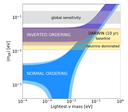Nachrichten

Observation of low-energy Excess in XENON1T
The XENON1T dark matter detector observes an unexpected excess of electron recoil events at low energies. This big question is: what is it?

The transparency of Teflon to Xenon Light
Researchers from the Universities of Freiburg and Münster have measured how liquid xenon scintillation light is blocked by PTFE (Teflon).

Solar neutrinos in the ultimate dark matter detector
Multi ton-scale liquid xenon-based dark matter detectors also do have an excellent sensitivity for solar neutrinos.

The DARWIN Observatory can do neutrino physics as well
DARWIN will be very sensitive to the neutrinoless double beta decay of 136Xe -- even without any isotopic enrichment.

Assembly of the XENONnT TPC
Members of the Freiburg Astroparticle Physics group participated in the assembly of the XENONnT detector.

Study on Meteorites using the GeMSE spectrometer
Results from an interdisciplinary work of astroparticle physicists and geologists using our low-background facility GeMSE.

Christmas Lectures
The 2019 editions of the Freiburg Physics Christmas lectures were once more very successful.

Neutrinoless double beta decay with DARWIN
We presented the results of a study of the ULTIMATE team and colleagues at an APPEC community meeting in London.

Low-Mass Results from XENON1T
Using the charge signal (S2) only, XENON1T places tight constraints on various low-mass dark matter models.

Searching Particles with a Force Sensor
KWISP Detector at CERN places tight constraints on hypothetical dark energy particle.
PATRAS 2019 @ Freiburg
The Freiburg group for Experimental Astroparticle Physics hosted the 15th edition of the international "PATRAS Workshop on Axions, WIMPs and WISPs" from June 3-7, 2019.

XENON discovery makes Nature Cover Story
The universe is almost 14 billion years old. An inconceivable length of time by human standards – yet compared to some physical processes, it is but a moment. There are radioactive nuclei that decay on much longer time scales. Using our XENON1T detector at the INFN Gran Sasso National Laboratory, we were able to observe the decay of Xenon-124 atomic nuclei for the first time, which is the observation of the rarest process ever measured.













